An Analysis of Leadership and Management at TUI Group: A Report
VerifiedAdded on 2021/02/19
|20
|6997
|19
Report
AI Summary
This report analyzes leadership and management practices within TUI Group, a major travel and tourism company. It begins by exploring classical management theories like scientific, bureaucratic, and administrative management, and their applicability to TUI. The report then examines various leadership styles and the roles leaders play in motivating employees, acting as mentors, communicators, and navigators. It further delves into internal and external factors influencing management styles in the hospitality sector, considering organizational structures such as matrix and centralized models, and the Handy culture model. The report evaluates leadership and management skills, including hard and soft skills, and compares different organizational approaches. The analysis provides insights into how TUI can improve its management and leadership to enhance its service delivery and achieve its goals.
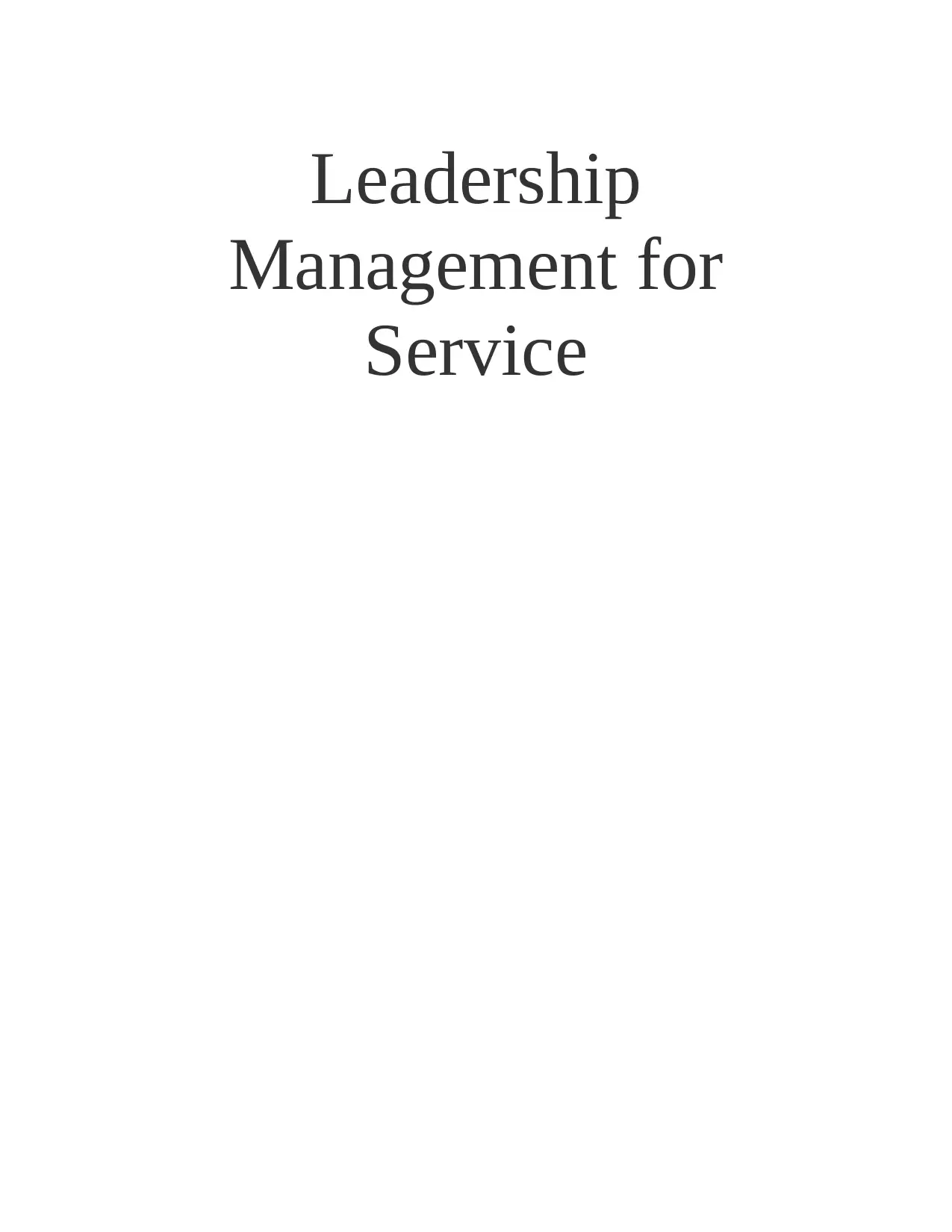
Leadership
Management for
Service
Management for
Service
Paraphrase This Document
Need a fresh take? Get an instant paraphrase of this document with our AI Paraphraser
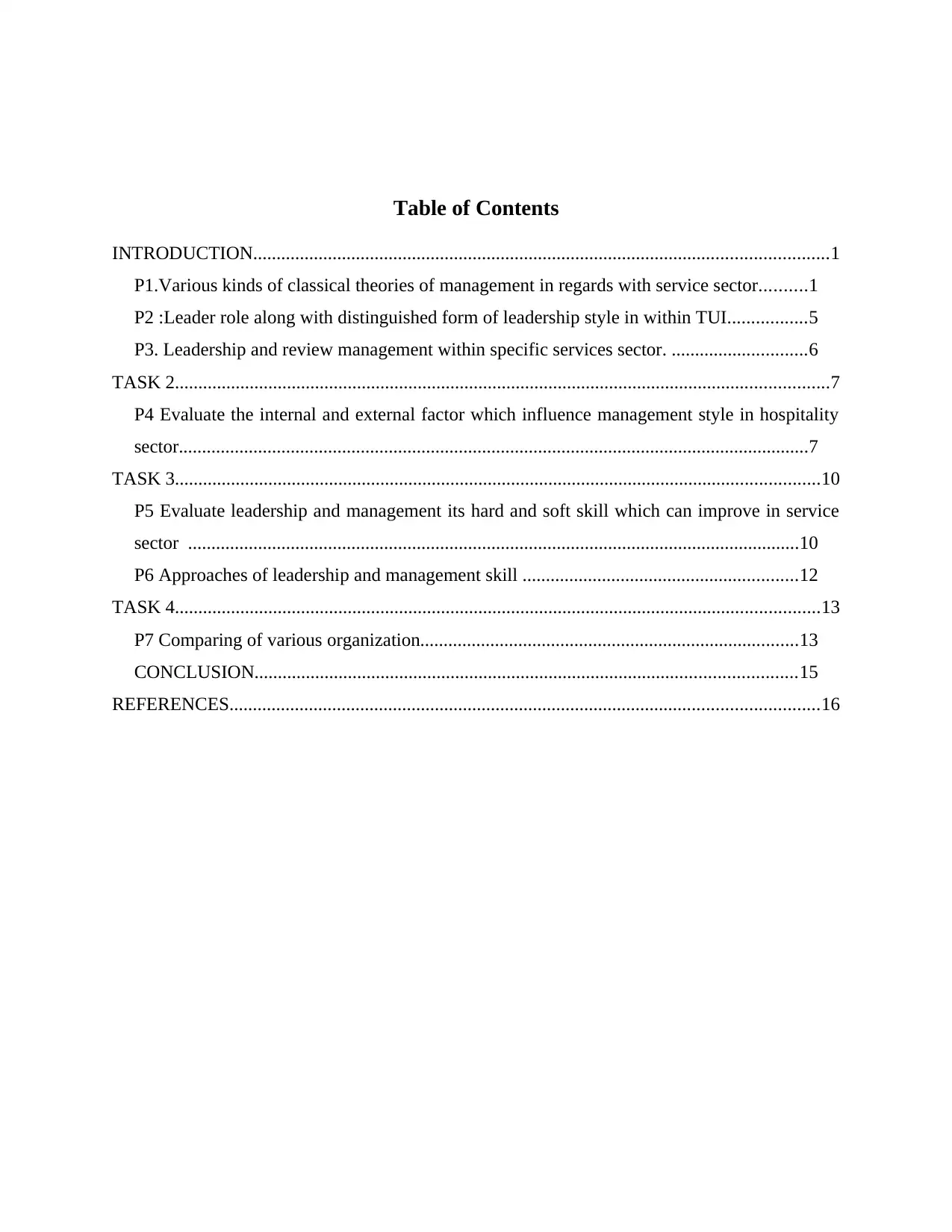
Table of Contents
INTRODUCTION...........................................................................................................................1
P1.Various kinds of classical theories of management in regards with service sector..........1
P2 :Leader role along with distinguished form of leadership style in within TUI.................5
P3. Leadership and review management within specific services sector. .............................6
TASK 2............................................................................................................................................7
P4 Evaluate the internal and external factor which influence management style in hospitality
sector.......................................................................................................................................7
TASK 3..........................................................................................................................................10
P5 Evaluate leadership and management its hard and soft skill which can improve in service
sector ...................................................................................................................................10
P6 Approaches of leadership and management skill ...........................................................12
TASK 4..........................................................................................................................................13
P7 Comparing of various organization.................................................................................13
CONCLUSION....................................................................................................................15
REFERENCES..............................................................................................................................16
INTRODUCTION...........................................................................................................................1
P1.Various kinds of classical theories of management in regards with service sector..........1
P2 :Leader role along with distinguished form of leadership style in within TUI.................5
P3. Leadership and review management within specific services sector. .............................6
TASK 2............................................................................................................................................7
P4 Evaluate the internal and external factor which influence management style in hospitality
sector.......................................................................................................................................7
TASK 3..........................................................................................................................................10
P5 Evaluate leadership and management its hard and soft skill which can improve in service
sector ...................................................................................................................................10
P6 Approaches of leadership and management skill ...........................................................12
TASK 4..........................................................................................................................................13
P7 Comparing of various organization.................................................................................13
CONCLUSION....................................................................................................................15
REFERENCES..............................................................................................................................16
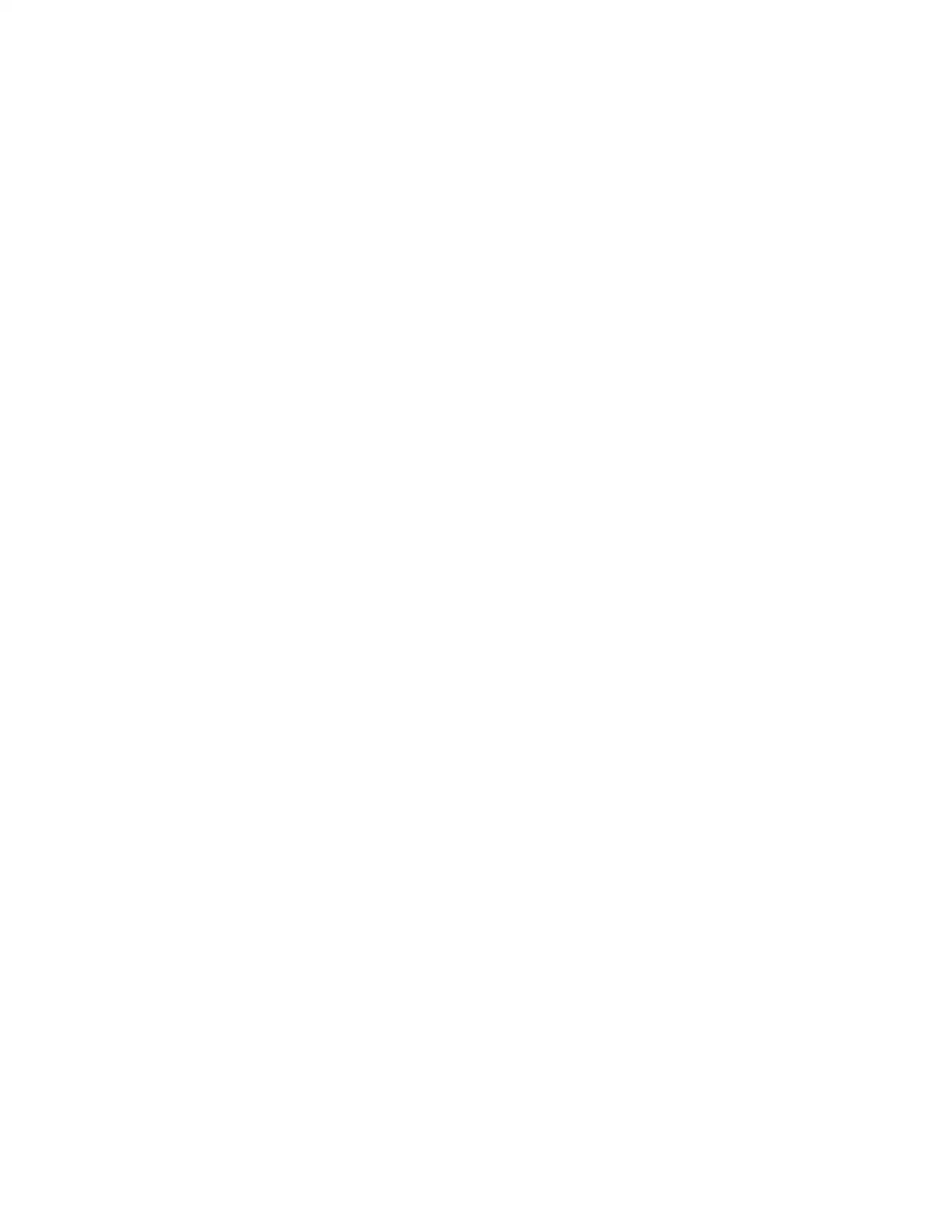
⊘ This is a preview!⊘
Do you want full access?
Subscribe today to unlock all pages.

Trusted by 1+ million students worldwide
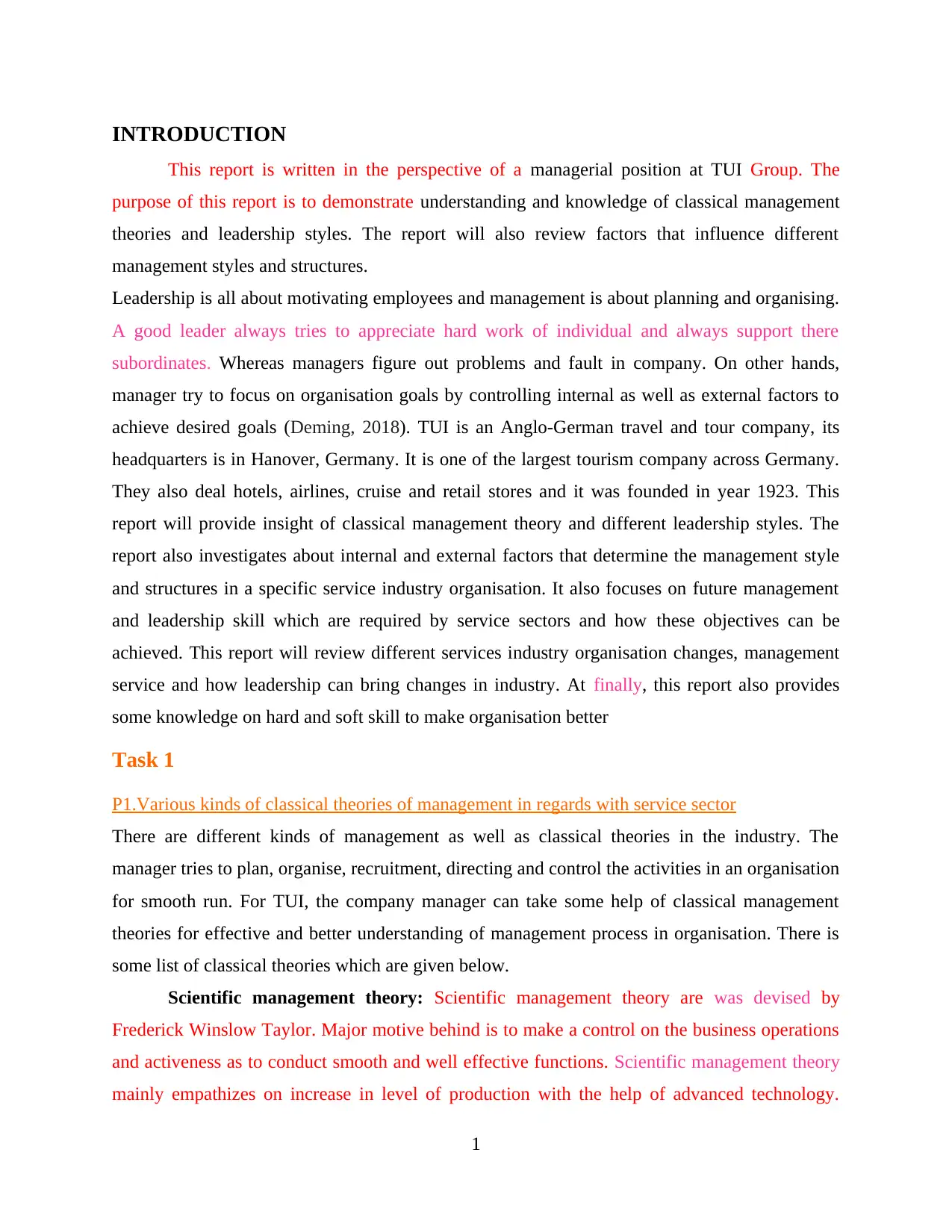
INTRODUCTION
This report is written in the perspective of a managerial position at TUI Group. The
purpose of this report is to demonstrate understanding and knowledge of classical management
theories and leadership styles. The report will also review factors that influence different
management styles and structures.
Leadership is all about motivating employees and management is about planning and organising.
A good leader always tries to appreciate hard work of individual and always support there
subordinates. Whereas managers figure out problems and fault in company. On other hands,
manager try to focus on organisation goals by controlling internal as well as external factors to
achieve desired goals (Deming, 2018). TUI is an Anglo-German travel and tour company, its
headquarters is in Hanover, Germany. It is one of the largest tourism company across Germany.
They also deal hotels, airlines, cruise and retail stores and it was founded in year 1923. This
report will provide insight of classical management theory and different leadership styles. The
report also investigates about internal and external factors that determine the management style
and structures in a specific service industry organisation. It also focuses on future management
and leadership skill which are required by service sectors and how these objectives can be
achieved. This report will review different services industry organisation changes, management
service and how leadership can bring changes in industry. At finally, this report also provides
some knowledge on hard and soft skill to make organisation better
Task 1
P1.Various kinds of classical theories of management in regards with service sector
There are different kinds of management as well as classical theories in the industry. The
manager tries to plan, organise, recruitment, directing and control the activities in an organisation
for smooth run. For TUI, the company manager can take some help of classical management
theories for effective and better understanding of management process in organisation. There is
some list of classical theories which are given below.
Scientific management theory: Scientific management theory are was devised by
Frederick Winslow Taylor. Major motive behind is to make a control on the business operations
and activeness as to conduct smooth and well effective functions. Scientific management theory
mainly empathizes on increase in level of production with the help of advanced technology.
1
This report is written in the perspective of a managerial position at TUI Group. The
purpose of this report is to demonstrate understanding and knowledge of classical management
theories and leadership styles. The report will also review factors that influence different
management styles and structures.
Leadership is all about motivating employees and management is about planning and organising.
A good leader always tries to appreciate hard work of individual and always support there
subordinates. Whereas managers figure out problems and fault in company. On other hands,
manager try to focus on organisation goals by controlling internal as well as external factors to
achieve desired goals (Deming, 2018). TUI is an Anglo-German travel and tour company, its
headquarters is in Hanover, Germany. It is one of the largest tourism company across Germany.
They also deal hotels, airlines, cruise and retail stores and it was founded in year 1923. This
report will provide insight of classical management theory and different leadership styles. The
report also investigates about internal and external factors that determine the management style
and structures in a specific service industry organisation. It also focuses on future management
and leadership skill which are required by service sectors and how these objectives can be
achieved. This report will review different services industry organisation changes, management
service and how leadership can bring changes in industry. At finally, this report also provides
some knowledge on hard and soft skill to make organisation better
Task 1
P1.Various kinds of classical theories of management in regards with service sector
There are different kinds of management as well as classical theories in the industry. The
manager tries to plan, organise, recruitment, directing and control the activities in an organisation
for smooth run. For TUI, the company manager can take some help of classical management
theories for effective and better understanding of management process in organisation. There is
some list of classical theories which are given below.
Scientific management theory: Scientific management theory are was devised by
Frederick Winslow Taylor. Major motive behind is to make a control on the business operations
and activeness as to conduct smooth and well effective functions. Scientific management theory
mainly empathizes on increase in level of production with the help of advanced technology.
1
Paraphrase This Document
Need a fresh take? Get an instant paraphrase of this document with our AI Paraphraser
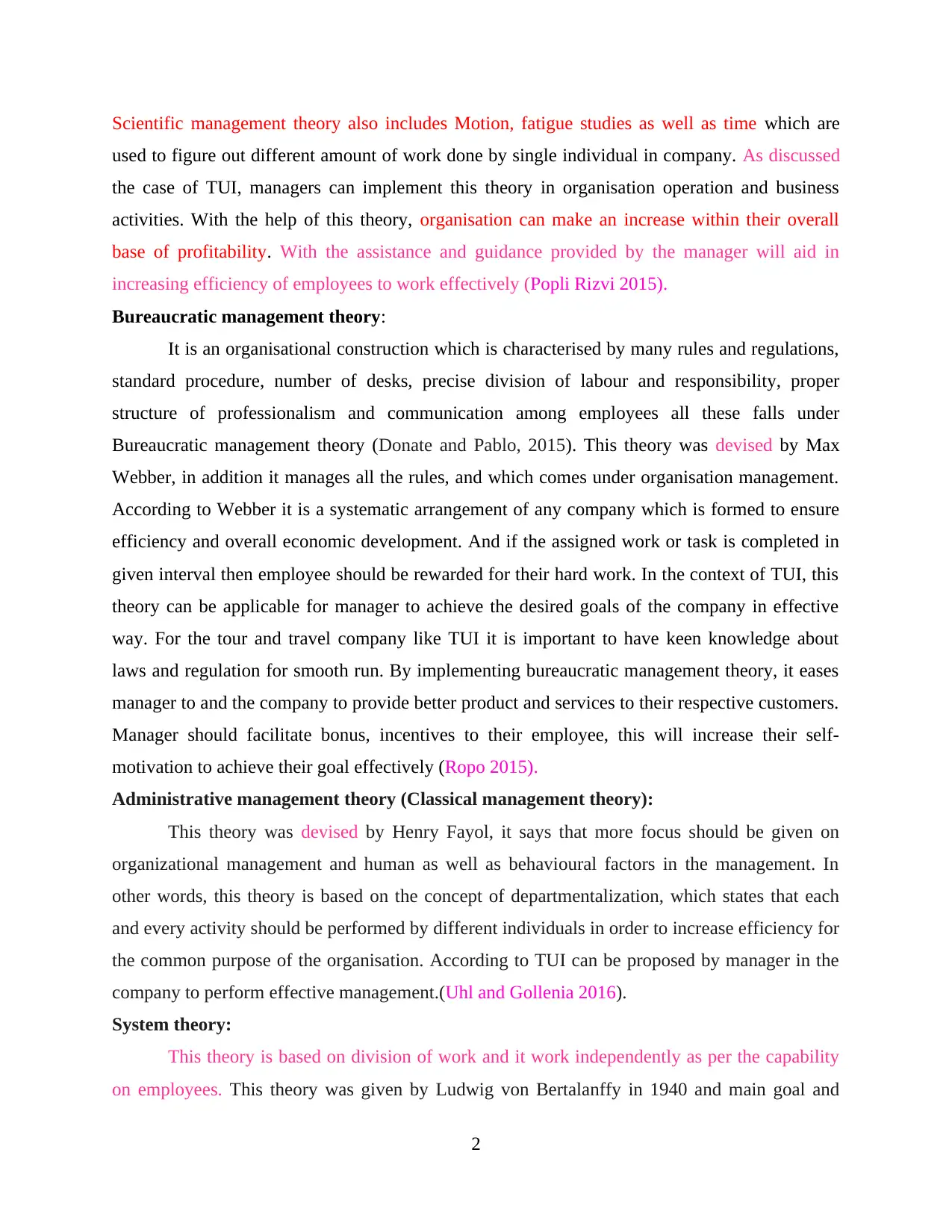
Scientific management theory also includes Motion, fatigue studies as well as time which are
used to figure out different amount of work done by single individual in company. As discussed
the case of TUI, managers can implement this theory in organisation operation and business
activities. With the help of this theory, organisation can make an increase within their overall
base of profitability. With the assistance and guidance provided by the manager will aid in
increasing efficiency of employees to work effectively (Popli Rizvi 2015).
Bureaucratic management theory:
It is an organisational construction which is characterised by many rules and regulations,
standard procedure, number of desks, precise division of labour and responsibility, proper
structure of professionalism and communication among employees all these falls under
Bureaucratic management theory (Donate and Pablo, 2015). This theory was devised by Max
Webber, in addition it manages all the rules, and which comes under organisation management.
According to Webber it is a systematic arrangement of any company which is formed to ensure
efficiency and overall economic development. And if the assigned work or task is completed in
given interval then employee should be rewarded for their hard work. In the context of TUI, this
theory can be applicable for manager to achieve the desired goals of the company in effective
way. For the tour and travel company like TUI it is important to have keen knowledge about
laws and regulation for smooth run. By implementing bureaucratic management theory, it eases
manager to and the company to provide better product and services to their respective customers.
Manager should facilitate bonus, incentives to their employee, this will increase their self-
motivation to achieve their goal effectively (Ropo 2015).
Administrative management theory (Classical management theory):
This theory was devised by Henry Fayol, it says that more focus should be given on
organizational management and human as well as behavioural factors in the management. In
other words, this theory is based on the concept of departmentalization, which states that each
and every activity should be performed by different individuals in order to increase efficiency for
the common purpose of the organisation. According to TUI can be proposed by manager in the
company to perform effective management.(Uhl and Gollenia 2016).
System theory:
This theory is based on division of work and it work independently as per the capability
on employees. This theory was given by Ludwig von Bertalanffy in 1940 and main goal and
2
used to figure out different amount of work done by single individual in company. As discussed
the case of TUI, managers can implement this theory in organisation operation and business
activities. With the help of this theory, organisation can make an increase within their overall
base of profitability. With the assistance and guidance provided by the manager will aid in
increasing efficiency of employees to work effectively (Popli Rizvi 2015).
Bureaucratic management theory:
It is an organisational construction which is characterised by many rules and regulations,
standard procedure, number of desks, precise division of labour and responsibility, proper
structure of professionalism and communication among employees all these falls under
Bureaucratic management theory (Donate and Pablo, 2015). This theory was devised by Max
Webber, in addition it manages all the rules, and which comes under organisation management.
According to Webber it is a systematic arrangement of any company which is formed to ensure
efficiency and overall economic development. And if the assigned work or task is completed in
given interval then employee should be rewarded for their hard work. In the context of TUI, this
theory can be applicable for manager to achieve the desired goals of the company in effective
way. For the tour and travel company like TUI it is important to have keen knowledge about
laws and regulation for smooth run. By implementing bureaucratic management theory, it eases
manager to and the company to provide better product and services to their respective customers.
Manager should facilitate bonus, incentives to their employee, this will increase their self-
motivation to achieve their goal effectively (Ropo 2015).
Administrative management theory (Classical management theory):
This theory was devised by Henry Fayol, it says that more focus should be given on
organizational management and human as well as behavioural factors in the management. In
other words, this theory is based on the concept of departmentalization, which states that each
and every activity should be performed by different individuals in order to increase efficiency for
the common purpose of the organisation. According to TUI can be proposed by manager in the
company to perform effective management.(Uhl and Gollenia 2016).
System theory:
This theory is based on division of work and it work independently as per the capability
on employees. This theory was given by Ludwig von Bertalanffy in 1940 and main goal and
2
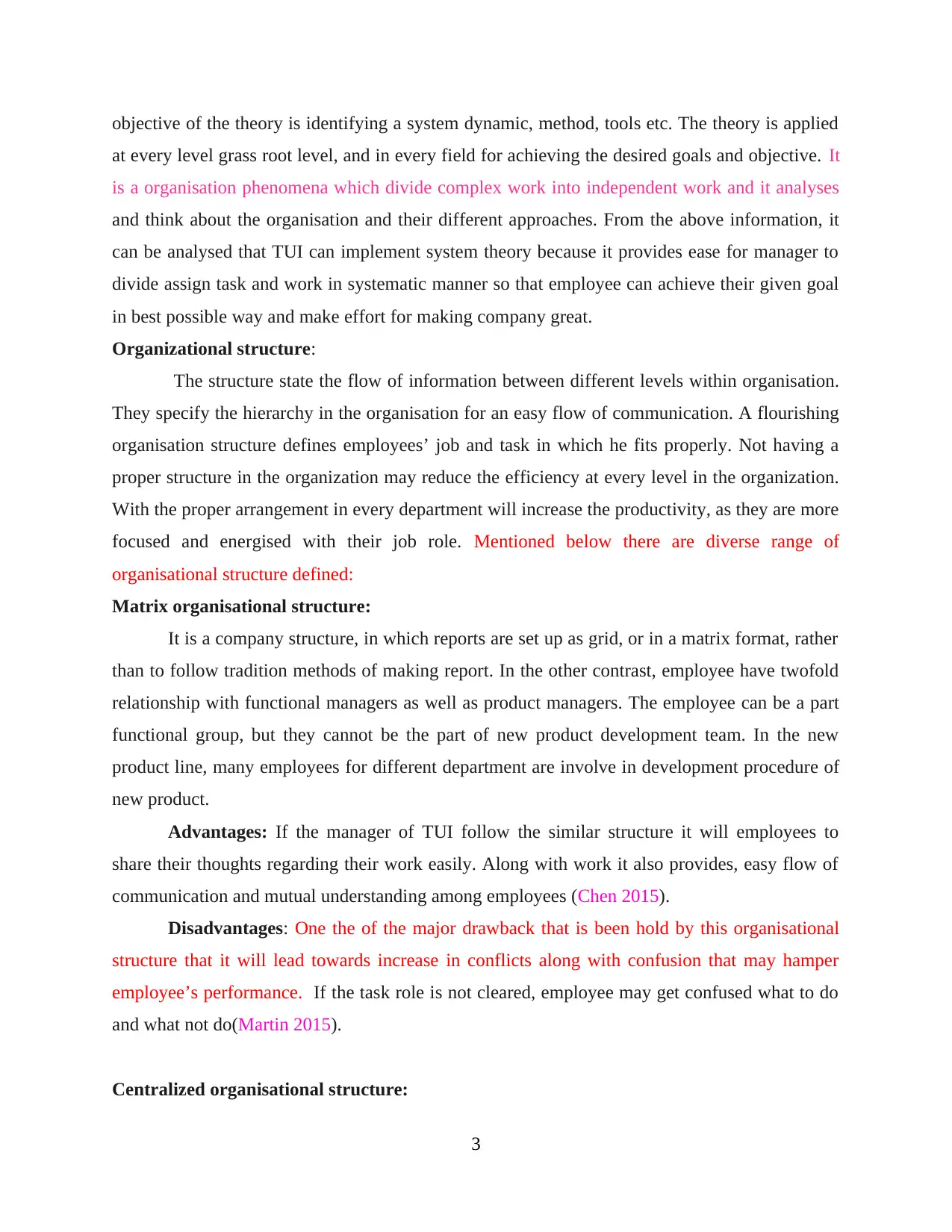
objective of the theory is identifying a system dynamic, method, tools etc. The theory is applied
at every level grass root level, and in every field for achieving the desired goals and objective. It
is a organisation phenomena which divide complex work into independent work and it analyses
and think about the organisation and their different approaches. From the above information, it
can be analysed that TUI can implement system theory because it provides ease for manager to
divide assign task and work in systematic manner so that employee can achieve their given goal
in best possible way and make effort for making company great.
Organizational structure:
The structure state the flow of information between different levels within organisation.
They specify the hierarchy in the organisation for an easy flow of communication. A flourishing
organisation structure defines employees’ job and task in which he fits properly. Not having a
proper structure in the organization may reduce the efficiency at every level in the organization.
With the proper arrangement in every department will increase the productivity, as they are more
focused and energised with their job role. Mentioned below there are diverse range of
organisational structure defined:
Matrix organisational structure:
It is a company structure, in which reports are set up as grid, or in a matrix format, rather
than to follow tradition methods of making report. In the other contrast, employee have twofold
relationship with functional managers as well as product managers. The employee can be a part
functional group, but they cannot be the part of new product development team. In the new
product line, many employees for different department are involve in development procedure of
new product.
Advantages: If the manager of TUI follow the similar structure it will employees to
share their thoughts regarding their work easily. Along with work it also provides, easy flow of
communication and mutual understanding among employees (Chen 2015).
Disadvantages: One the of the major drawback that is been hold by this organisational
structure that it will lead towards increase in conflicts along with confusion that may hamper
employee’s performance. If the task role is not cleared, employee may get confused what to do
and what not do(Martin 2015).
Centralized organisational structure:
3
at every level grass root level, and in every field for achieving the desired goals and objective. It
is a organisation phenomena which divide complex work into independent work and it analyses
and think about the organisation and their different approaches. From the above information, it
can be analysed that TUI can implement system theory because it provides ease for manager to
divide assign task and work in systematic manner so that employee can achieve their given goal
in best possible way and make effort for making company great.
Organizational structure:
The structure state the flow of information between different levels within organisation.
They specify the hierarchy in the organisation for an easy flow of communication. A flourishing
organisation structure defines employees’ job and task in which he fits properly. Not having a
proper structure in the organization may reduce the efficiency at every level in the organization.
With the proper arrangement in every department will increase the productivity, as they are more
focused and energised with their job role. Mentioned below there are diverse range of
organisational structure defined:
Matrix organisational structure:
It is a company structure, in which reports are set up as grid, or in a matrix format, rather
than to follow tradition methods of making report. In the other contrast, employee have twofold
relationship with functional managers as well as product managers. The employee can be a part
functional group, but they cannot be the part of new product development team. In the new
product line, many employees for different department are involve in development procedure of
new product.
Advantages: If the manager of TUI follow the similar structure it will employees to
share their thoughts regarding their work easily. Along with work it also provides, easy flow of
communication and mutual understanding among employees (Chen 2015).
Disadvantages: One the of the major drawback that is been hold by this organisational
structure that it will lead towards increase in conflicts along with confusion that may hamper
employee’s performance. If the task role is not cleared, employee may get confused what to do
and what not do(Martin 2015).
Centralized organisational structure:
3
⊘ This is a preview!⊘
Do you want full access?
Subscribe today to unlock all pages.

Trusted by 1+ million students worldwide
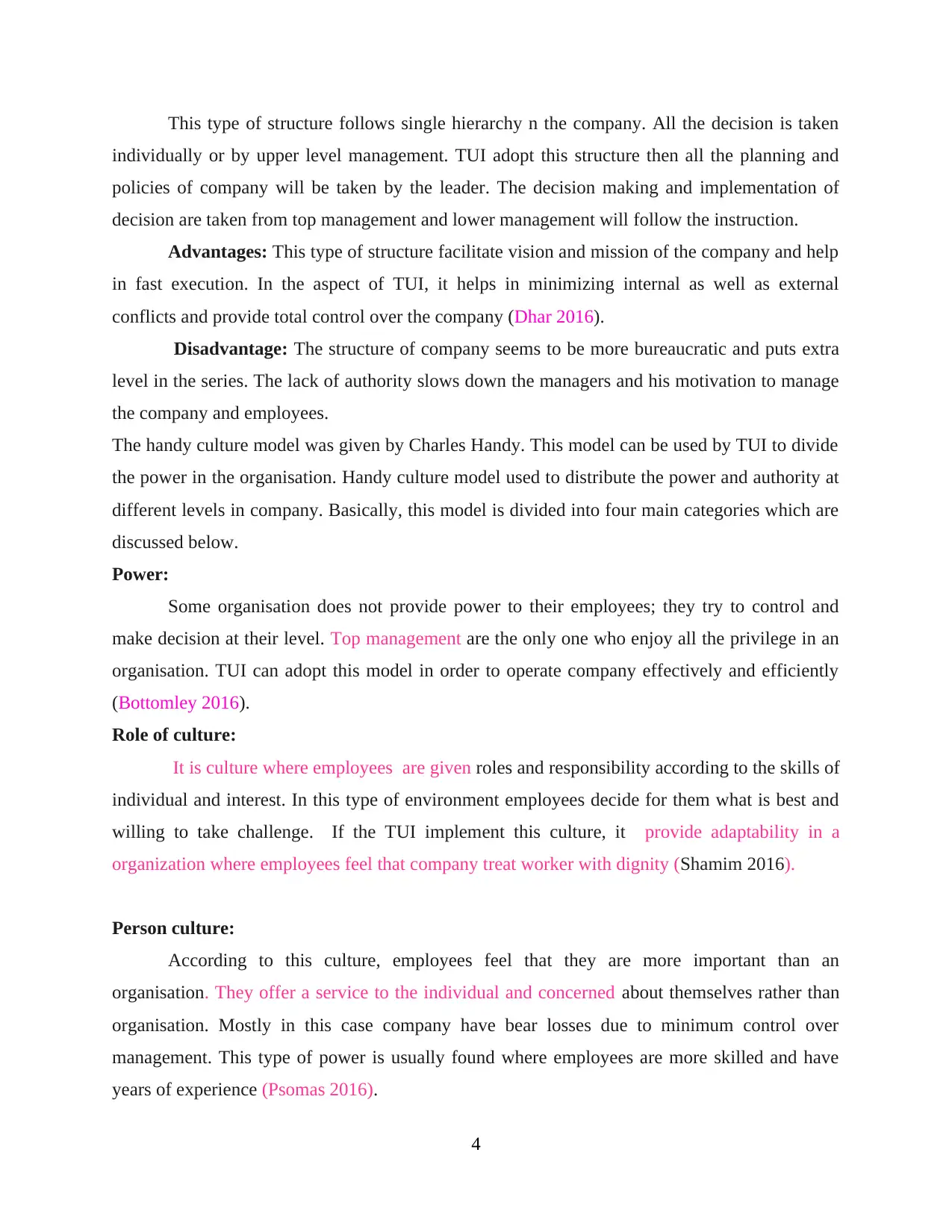
This type of structure follows single hierarchy n the company. All the decision is taken
individually or by upper level management. TUI adopt this structure then all the planning and
policies of company will be taken by the leader. The decision making and implementation of
decision are taken from top management and lower management will follow the instruction.
Advantages: This type of structure facilitate vision and mission of the company and help
in fast execution. In the aspect of TUI, it helps in minimizing internal as well as external
conflicts and provide total control over the company (Dhar 2016).
Disadvantage: The structure of company seems to be more bureaucratic and puts extra
level in the series. The lack of authority slows down the managers and his motivation to manage
the company and employees.
The handy culture model was given by Charles Handy. This model can be used by TUI to divide
the power in the organisation. Handy culture model used to distribute the power and authority at
different levels in company. Basically, this model is divided into four main categories which are
discussed below.
Power:
Some organisation does not provide power to their employees; they try to control and
make decision at their level. Top management are the only one who enjoy all the privilege in an
organisation. TUI can adopt this model in order to operate company effectively and efficiently
(Bottomley 2016).
Role of culture:
It is culture where employees are given roles and responsibility according to the skills of
individual and interest. In this type of environment employees decide for them what is best and
willing to take challenge. If the TUI implement this culture, it provide adaptability in a
organization where employees feel that company treat worker with dignity (Shamim 2016).
Person culture:
According to this culture, employees feel that they are more important than an
organisation. They offer a service to the individual and concerned about themselves rather than
organisation. Mostly in this case company have bear losses due to minimum control over
management. This type of power is usually found where employees are more skilled and have
years of experience (Psomas 2016).
4
individually or by upper level management. TUI adopt this structure then all the planning and
policies of company will be taken by the leader. The decision making and implementation of
decision are taken from top management and lower management will follow the instruction.
Advantages: This type of structure facilitate vision and mission of the company and help
in fast execution. In the aspect of TUI, it helps in minimizing internal as well as external
conflicts and provide total control over the company (Dhar 2016).
Disadvantage: The structure of company seems to be more bureaucratic and puts extra
level in the series. The lack of authority slows down the managers and his motivation to manage
the company and employees.
The handy culture model was given by Charles Handy. This model can be used by TUI to divide
the power in the organisation. Handy culture model used to distribute the power and authority at
different levels in company. Basically, this model is divided into four main categories which are
discussed below.
Power:
Some organisation does not provide power to their employees; they try to control and
make decision at their level. Top management are the only one who enjoy all the privilege in an
organisation. TUI can adopt this model in order to operate company effectively and efficiently
(Bottomley 2016).
Role of culture:
It is culture where employees are given roles and responsibility according to the skills of
individual and interest. In this type of environment employees decide for them what is best and
willing to take challenge. If the TUI implement this culture, it provide adaptability in a
organization where employees feel that company treat worker with dignity (Shamim 2016).
Person culture:
According to this culture, employees feel that they are more important than an
organisation. They offer a service to the individual and concerned about themselves rather than
organisation. Mostly in this case company have bear losses due to minimum control over
management. This type of power is usually found where employees are more skilled and have
years of experience (Psomas 2016).
4
Paraphrase This Document
Need a fresh take? Get an instant paraphrase of this document with our AI Paraphraser
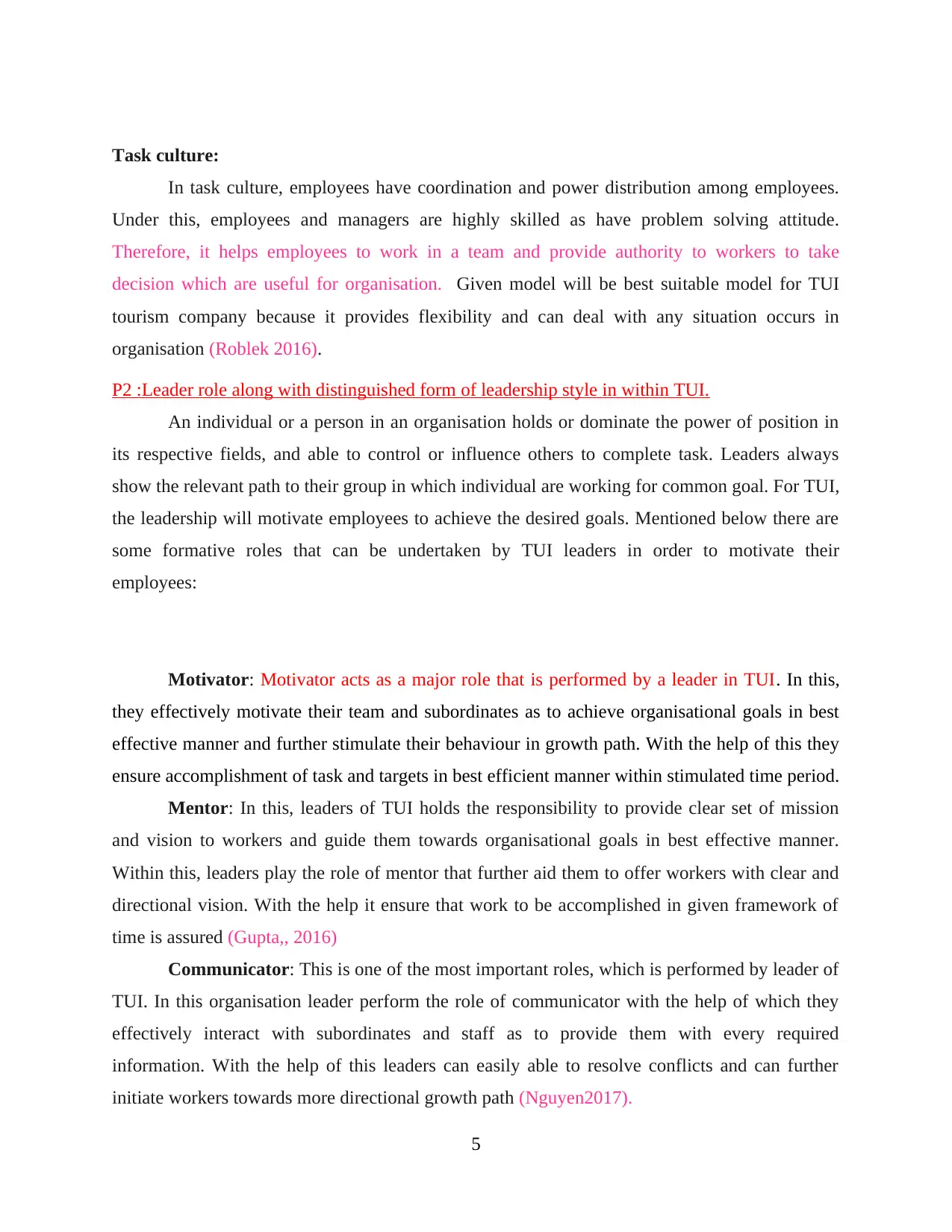
Task culture:
In task culture, employees have coordination and power distribution among employees.
Under this, employees and managers are highly skilled as have problem solving attitude.
Therefore, it helps employees to work in a team and provide authority to workers to take
decision which are useful for organisation. Given model will be best suitable model for TUI
tourism company because it provides flexibility and can deal with any situation occurs in
organisation (Roblek 2016).
P2 :Leader role along with distinguished form of leadership style in within TUI.
An individual or a person in an organisation holds or dominate the power of position in
its respective fields, and able to control or influence others to complete task. Leaders always
show the relevant path to their group in which individual are working for common goal. For TUI,
the leadership will motivate employees to achieve the desired goals. Mentioned below there are
some formative roles that can be undertaken by TUI leaders in order to motivate their
employees:
Motivator: Motivator acts as a major role that is performed by a leader in TUI. In this,
they effectively motivate their team and subordinates as to achieve organisational goals in best
effective manner and further stimulate their behaviour in growth path. With the help of this they
ensure accomplishment of task and targets in best efficient manner within stimulated time period.
Mentor: In this, leaders of TUI holds the responsibility to provide clear set of mission
and vision to workers and guide them towards organisational goals in best effective manner.
Within this, leaders play the role of mentor that further aid them to offer workers with clear and
directional vision. With the help it ensure that work to be accomplished in given framework of
time is assured (Gupta,, 2016)
Communicator: This is one of the most important roles, which is performed by leader of
TUI. In this organisation leader perform the role of communicator with the help of which they
effectively interact with subordinates and staff as to provide them with every required
information. With the help of this leaders can easily able to resolve conflicts and can further
initiate workers towards more directional growth path (Nguyen2017).
5
In task culture, employees have coordination and power distribution among employees.
Under this, employees and managers are highly skilled as have problem solving attitude.
Therefore, it helps employees to work in a team and provide authority to workers to take
decision which are useful for organisation. Given model will be best suitable model for TUI
tourism company because it provides flexibility and can deal with any situation occurs in
organisation (Roblek 2016).
P2 :Leader role along with distinguished form of leadership style in within TUI.
An individual or a person in an organisation holds or dominate the power of position in
its respective fields, and able to control or influence others to complete task. Leaders always
show the relevant path to their group in which individual are working for common goal. For TUI,
the leadership will motivate employees to achieve the desired goals. Mentioned below there are
some formative roles that can be undertaken by TUI leaders in order to motivate their
employees:
Motivator: Motivator acts as a major role that is performed by a leader in TUI. In this,
they effectively motivate their team and subordinates as to achieve organisational goals in best
effective manner and further stimulate their behaviour in growth path. With the help of this they
ensure accomplishment of task and targets in best efficient manner within stimulated time period.
Mentor: In this, leaders of TUI holds the responsibility to provide clear set of mission
and vision to workers and guide them towards organisational goals in best effective manner.
Within this, leaders play the role of mentor that further aid them to offer workers with clear and
directional vision. With the help it ensure that work to be accomplished in given framework of
time is assured (Gupta,, 2016)
Communicator: This is one of the most important roles, which is performed by leader of
TUI. In this organisation leader perform the role of communicator with the help of which they
effectively interact with subordinates and staff as to provide them with every required
information. With the help of this leaders can easily able to resolve conflicts and can further
initiate workers towards more directional growth path (Nguyen2017).
5
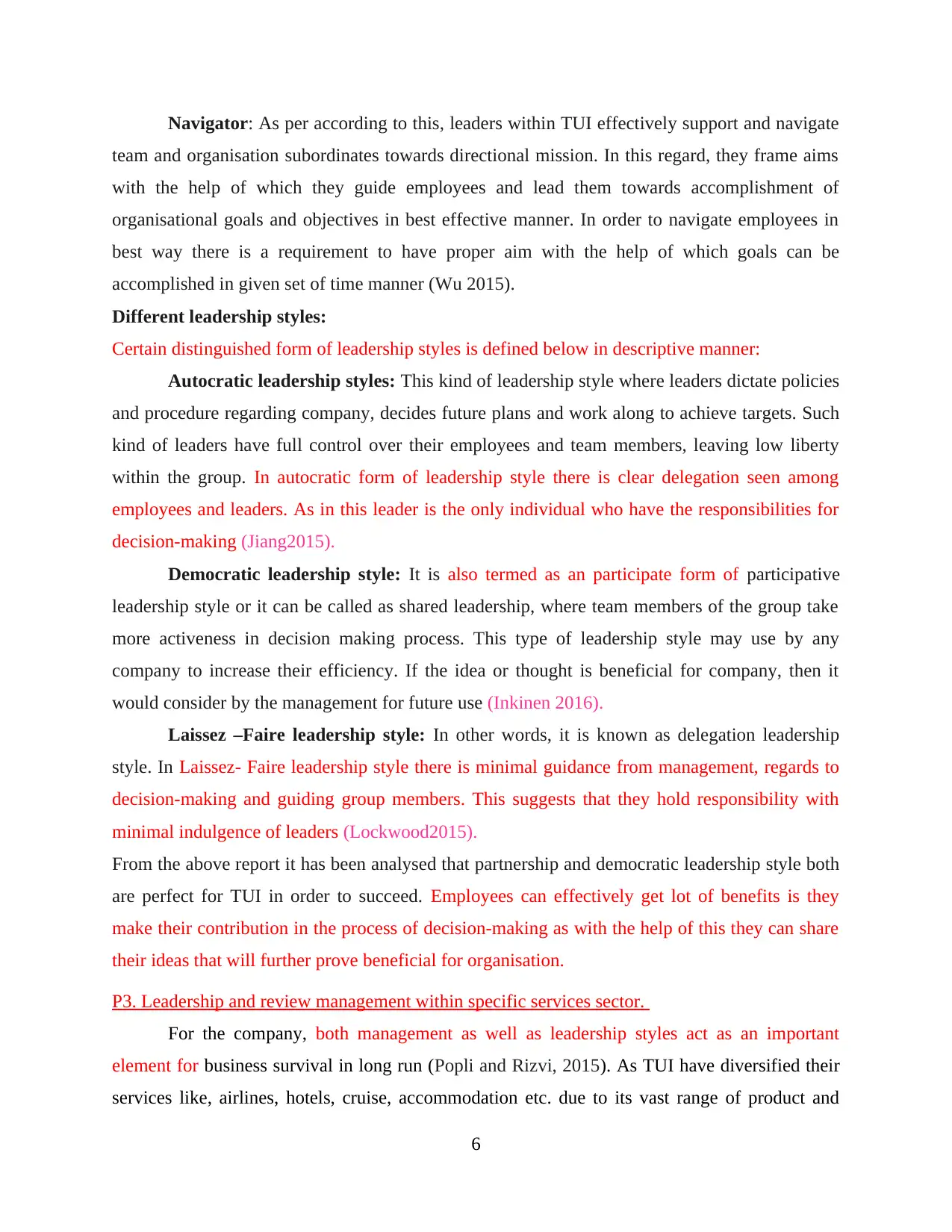
Navigator: As per according to this, leaders within TUI effectively support and navigate
team and organisation subordinates towards directional mission. In this regard, they frame aims
with the help of which they guide employees and lead them towards accomplishment of
organisational goals and objectives in best effective manner. In order to navigate employees in
best way there is a requirement to have proper aim with the help of which goals can be
accomplished in given set of time manner (Wu 2015).
Different leadership styles:
Certain distinguished form of leadership styles is defined below in descriptive manner:
Autocratic leadership styles: This kind of leadership style where leaders dictate policies
and procedure regarding company, decides future plans and work along to achieve targets. Such
kind of leaders have full control over their employees and team members, leaving low liberty
within the group. In autocratic form of leadership style there is clear delegation seen among
employees and leaders. As in this leader is the only individual who have the responsibilities for
decision-making (Jiang2015).
Democratic leadership style: It is also termed as an participate form of participative
leadership style or it can be called as shared leadership, where team members of the group take
more activeness in decision making process. This type of leadership style may use by any
company to increase their efficiency. If the idea or thought is beneficial for company, then it
would consider by the management for future use (Inkinen 2016).
Laissez –Faire leadership style: In other words, it is known as delegation leadership
style. In Laissez- Faire leadership style there is minimal guidance from management, regards to
decision-making and guiding group members. This suggests that they hold responsibility with
minimal indulgence of leaders (Lockwood2015).
From the above report it has been analysed that partnership and democratic leadership style both
are perfect for TUI in order to succeed. Employees can effectively get lot of benefits is they
make their contribution in the process of decision-making as with the help of this they can share
their ideas that will further prove beneficial for organisation.
P3. Leadership and review management within specific services sector.
For the company, both management as well as leadership styles act as an important
element for business survival in long run (Popli and Rizvi, 2015). As TUI have diversified their
services like, airlines, hotels, cruise, accommodation etc. due to its vast range of product and
6
team and organisation subordinates towards directional mission. In this regard, they frame aims
with the help of which they guide employees and lead them towards accomplishment of
organisational goals and objectives in best effective manner. In order to navigate employees in
best way there is a requirement to have proper aim with the help of which goals can be
accomplished in given set of time manner (Wu 2015).
Different leadership styles:
Certain distinguished form of leadership styles is defined below in descriptive manner:
Autocratic leadership styles: This kind of leadership style where leaders dictate policies
and procedure regarding company, decides future plans and work along to achieve targets. Such
kind of leaders have full control over their employees and team members, leaving low liberty
within the group. In autocratic form of leadership style there is clear delegation seen among
employees and leaders. As in this leader is the only individual who have the responsibilities for
decision-making (Jiang2015).
Democratic leadership style: It is also termed as an participate form of participative
leadership style or it can be called as shared leadership, where team members of the group take
more activeness in decision making process. This type of leadership style may use by any
company to increase their efficiency. If the idea or thought is beneficial for company, then it
would consider by the management for future use (Inkinen 2016).
Laissez –Faire leadership style: In other words, it is known as delegation leadership
style. In Laissez- Faire leadership style there is minimal guidance from management, regards to
decision-making and guiding group members. This suggests that they hold responsibility with
minimal indulgence of leaders (Lockwood2015).
From the above report it has been analysed that partnership and democratic leadership style both
are perfect for TUI in order to succeed. Employees can effectively get lot of benefits is they
make their contribution in the process of decision-making as with the help of this they can share
their ideas that will further prove beneficial for organisation.
P3. Leadership and review management within specific services sector.
For the company, both management as well as leadership styles act as an important
element for business survival in long run (Popli and Rizvi, 2015). As TUI have diversified their
services like, airlines, hotels, cruise, accommodation etc. due to its vast range of product and
6
⊘ This is a preview!⊘
Do you want full access?
Subscribe today to unlock all pages.

Trusted by 1+ million students worldwide
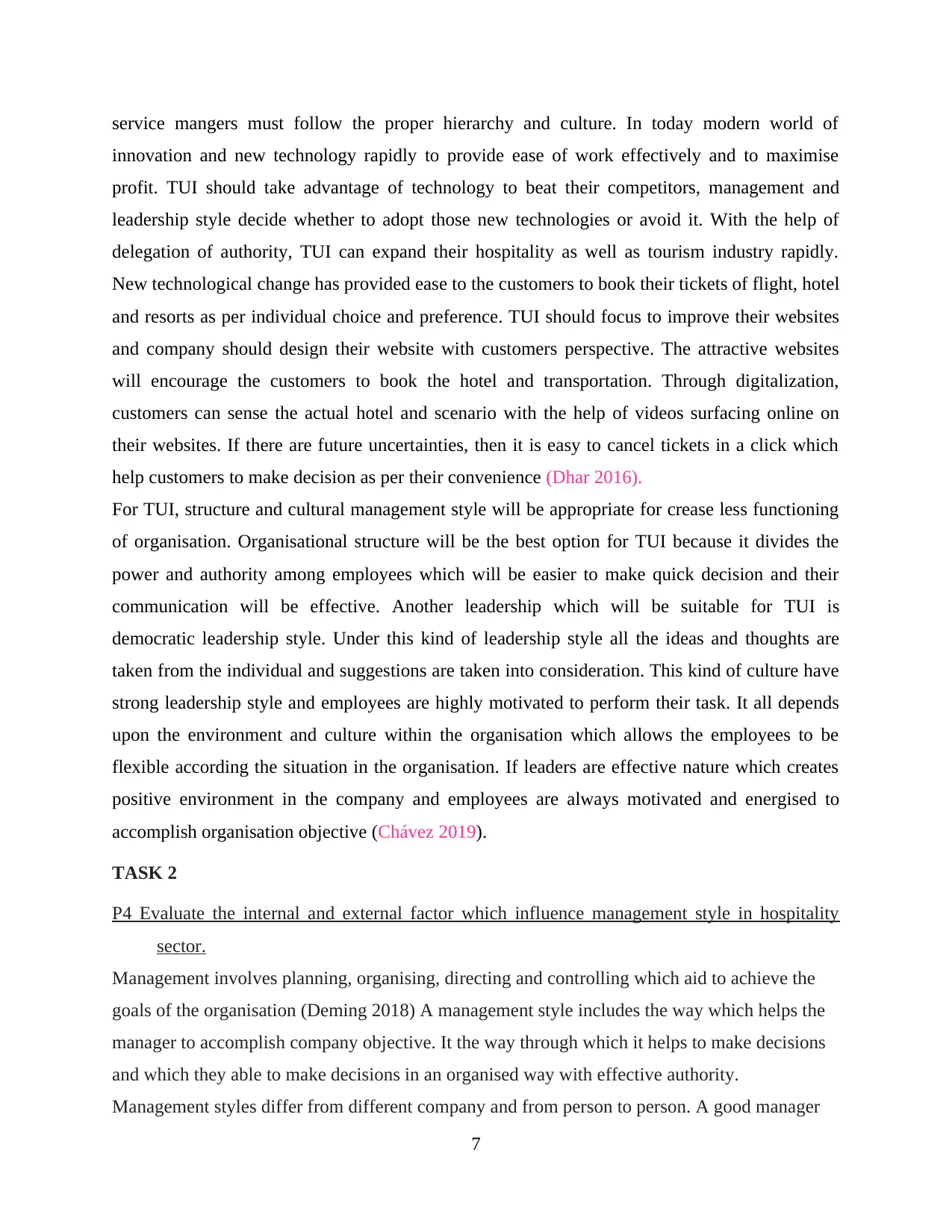
service mangers must follow the proper hierarchy and culture. In today modern world of
innovation and new technology rapidly to provide ease of work effectively and to maximise
profit. TUI should take advantage of technology to beat their competitors, management and
leadership style decide whether to adopt those new technologies or avoid it. With the help of
delegation of authority, TUI can expand their hospitality as well as tourism industry rapidly.
New technological change has provided ease to the customers to book their tickets of flight, hotel
and resorts as per individual choice and preference. TUI should focus to improve their websites
and company should design their website with customers perspective. The attractive websites
will encourage the customers to book the hotel and transportation. Through digitalization,
customers can sense the actual hotel and scenario with the help of videos surfacing online on
their websites. If there are future uncertainties, then it is easy to cancel tickets in a click which
help customers to make decision as per their convenience (Dhar 2016).
For TUI, structure and cultural management style will be appropriate for crease less functioning
of organisation. Organisational structure will be the best option for TUI because it divides the
power and authority among employees which will be easier to make quick decision and their
communication will be effective. Another leadership which will be suitable for TUI is
democratic leadership style. Under this kind of leadership style all the ideas and thoughts are
taken from the individual and suggestions are taken into consideration. This kind of culture have
strong leadership style and employees are highly motivated to perform their task. It all depends
upon the environment and culture within the organisation which allows the employees to be
flexible according the situation in the organisation. If leaders are effective nature which creates
positive environment in the company and employees are always motivated and energised to
accomplish organisation objective (Chávez 2019).
TASK 2
P4 Evaluate the internal and external factor which influence management style in hospitality
sector.
Management involves planning, organising, directing and controlling which aid to achieve the
goals of the organisation (Deming 2018) A management style includes the way which helps the
manager to accomplish company objective. It the way through which it helps to make decisions
and which they able to make decisions in an organised way with effective authority.
Management styles differ from different company and from person to person. A good manager
7
innovation and new technology rapidly to provide ease of work effectively and to maximise
profit. TUI should take advantage of technology to beat their competitors, management and
leadership style decide whether to adopt those new technologies or avoid it. With the help of
delegation of authority, TUI can expand their hospitality as well as tourism industry rapidly.
New technological change has provided ease to the customers to book their tickets of flight, hotel
and resorts as per individual choice and preference. TUI should focus to improve their websites
and company should design their website with customers perspective. The attractive websites
will encourage the customers to book the hotel and transportation. Through digitalization,
customers can sense the actual hotel and scenario with the help of videos surfacing online on
their websites. If there are future uncertainties, then it is easy to cancel tickets in a click which
help customers to make decision as per their convenience (Dhar 2016).
For TUI, structure and cultural management style will be appropriate for crease less functioning
of organisation. Organisational structure will be the best option for TUI because it divides the
power and authority among employees which will be easier to make quick decision and their
communication will be effective. Another leadership which will be suitable for TUI is
democratic leadership style. Under this kind of leadership style all the ideas and thoughts are
taken from the individual and suggestions are taken into consideration. This kind of culture have
strong leadership style and employees are highly motivated to perform their task. It all depends
upon the environment and culture within the organisation which allows the employees to be
flexible according the situation in the organisation. If leaders are effective nature which creates
positive environment in the company and employees are always motivated and energised to
accomplish organisation objective (Chávez 2019).
TASK 2
P4 Evaluate the internal and external factor which influence management style in hospitality
sector.
Management involves planning, organising, directing and controlling which aid to achieve the
goals of the organisation (Deming 2018) A management style includes the way which helps the
manager to accomplish company objective. It the way through which it helps to make decisions
and which they able to make decisions in an organised way with effective authority.
Management styles differ from different company and from person to person. A good manager
7
Paraphrase This Document
Need a fresh take? Get an instant paraphrase of this document with our AI Paraphraser
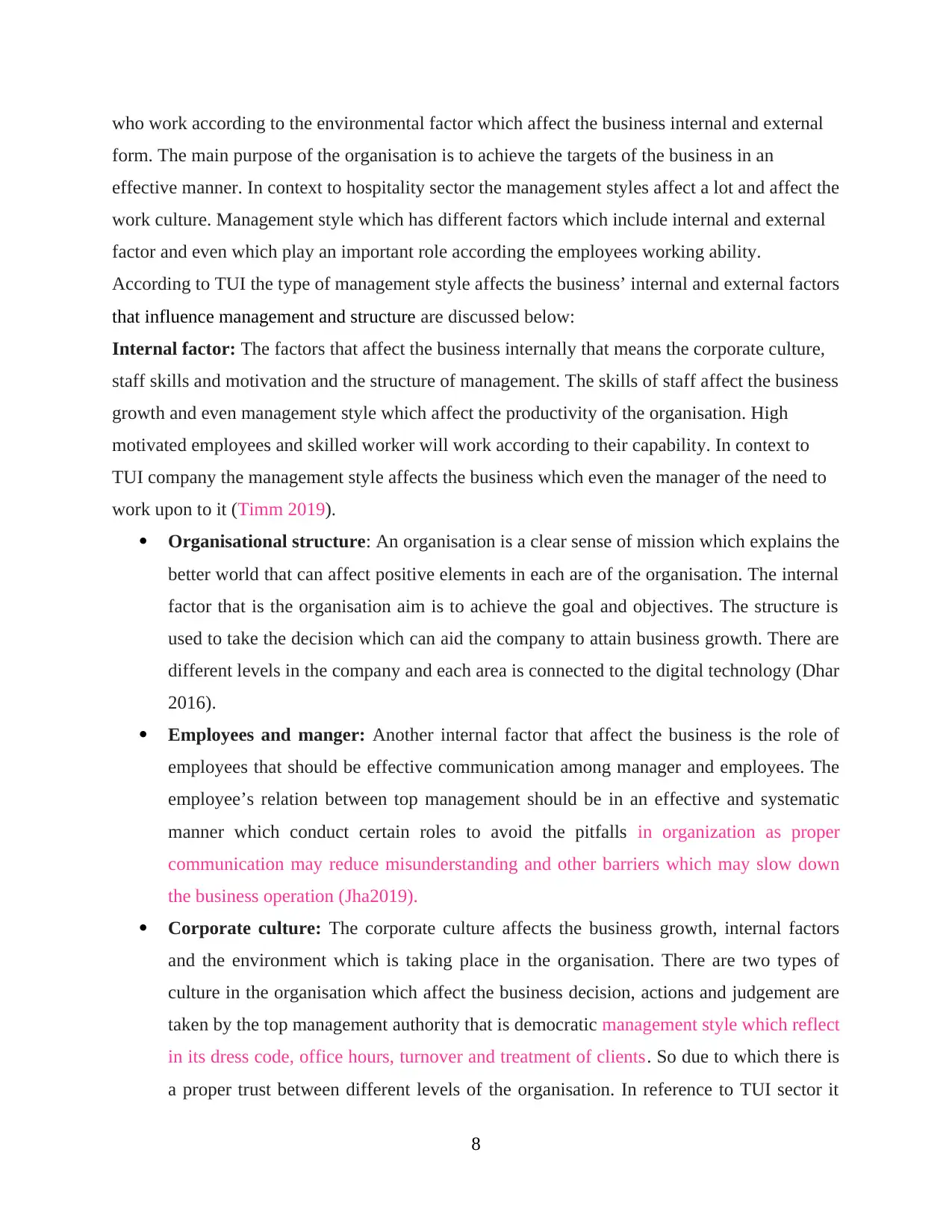
who work according to the environmental factor which affect the business internal and external
form. The main purpose of the organisation is to achieve the targets of the business in an
effective manner. In context to hospitality sector the management styles affect a lot and affect the
work culture. Management style which has different factors which include internal and external
factor and even which play an important role according the employees working ability.
According to TUI the type of management style affects the business’ internal and external factors
that influence management and structure are discussed below:
Internal factor: The factors that affect the business internally that means the corporate culture,
staff skills and motivation and the structure of management. The skills of staff affect the business
growth and even management style which affect the productivity of the organisation. High
motivated employees and skilled worker will work according to their capability. In context to
TUI company the management style affects the business which even the manager of the need to
work upon to it (Timm 2019).
Organisational structure: An organisation is a clear sense of mission which explains the
better world that can affect positive elements in each are of the organisation. The internal
factor that is the organisation aim is to achieve the goal and objectives. The structure is
used to take the decision which can aid the company to attain business growth. There are
different levels in the company and each area is connected to the digital technology (Dhar
2016).
Employees and manger: Another internal factor that affect the business is the role of
employees that should be effective communication among manager and employees. The
employee’s relation between top management should be in an effective and systematic
manner which conduct certain roles to avoid the pitfalls in organization as proper
communication may reduce misunderstanding and other barriers which may slow down
the business operation (Jha2019).
Corporate culture: The corporate culture affects the business growth, internal factors
and the environment which is taking place in the organisation. There are two types of
culture in the organisation which affect the business decision, actions and judgement are
taken by the top management authority that is democratic management style which reflect
in its dress code, office hours, turnover and treatment of clients. So due to which there is
a proper trust between different levels of the organisation. In reference to TUI sector it
8
form. The main purpose of the organisation is to achieve the targets of the business in an
effective manner. In context to hospitality sector the management styles affect a lot and affect the
work culture. Management style which has different factors which include internal and external
factor and even which play an important role according the employees working ability.
According to TUI the type of management style affects the business’ internal and external factors
that influence management and structure are discussed below:
Internal factor: The factors that affect the business internally that means the corporate culture,
staff skills and motivation and the structure of management. The skills of staff affect the business
growth and even management style which affect the productivity of the organisation. High
motivated employees and skilled worker will work according to their capability. In context to
TUI company the management style affects the business which even the manager of the need to
work upon to it (Timm 2019).
Organisational structure: An organisation is a clear sense of mission which explains the
better world that can affect positive elements in each are of the organisation. The internal
factor that is the organisation aim is to achieve the goal and objectives. The structure is
used to take the decision which can aid the company to attain business growth. There are
different levels in the company and each area is connected to the digital technology (Dhar
2016).
Employees and manger: Another internal factor that affect the business is the role of
employees that should be effective communication among manager and employees. The
employee’s relation between top management should be in an effective and systematic
manner which conduct certain roles to avoid the pitfalls in organization as proper
communication may reduce misunderstanding and other barriers which may slow down
the business operation (Jha2019).
Corporate culture: The corporate culture affects the business growth, internal factors
and the environment which is taking place in the organisation. There are two types of
culture in the organisation which affect the business decision, actions and judgement are
taken by the top management authority that is democratic management style which reflect
in its dress code, office hours, turnover and treatment of clients. So due to which there is
a proper trust between different levels of the organisation. In reference to TUI sector it
8
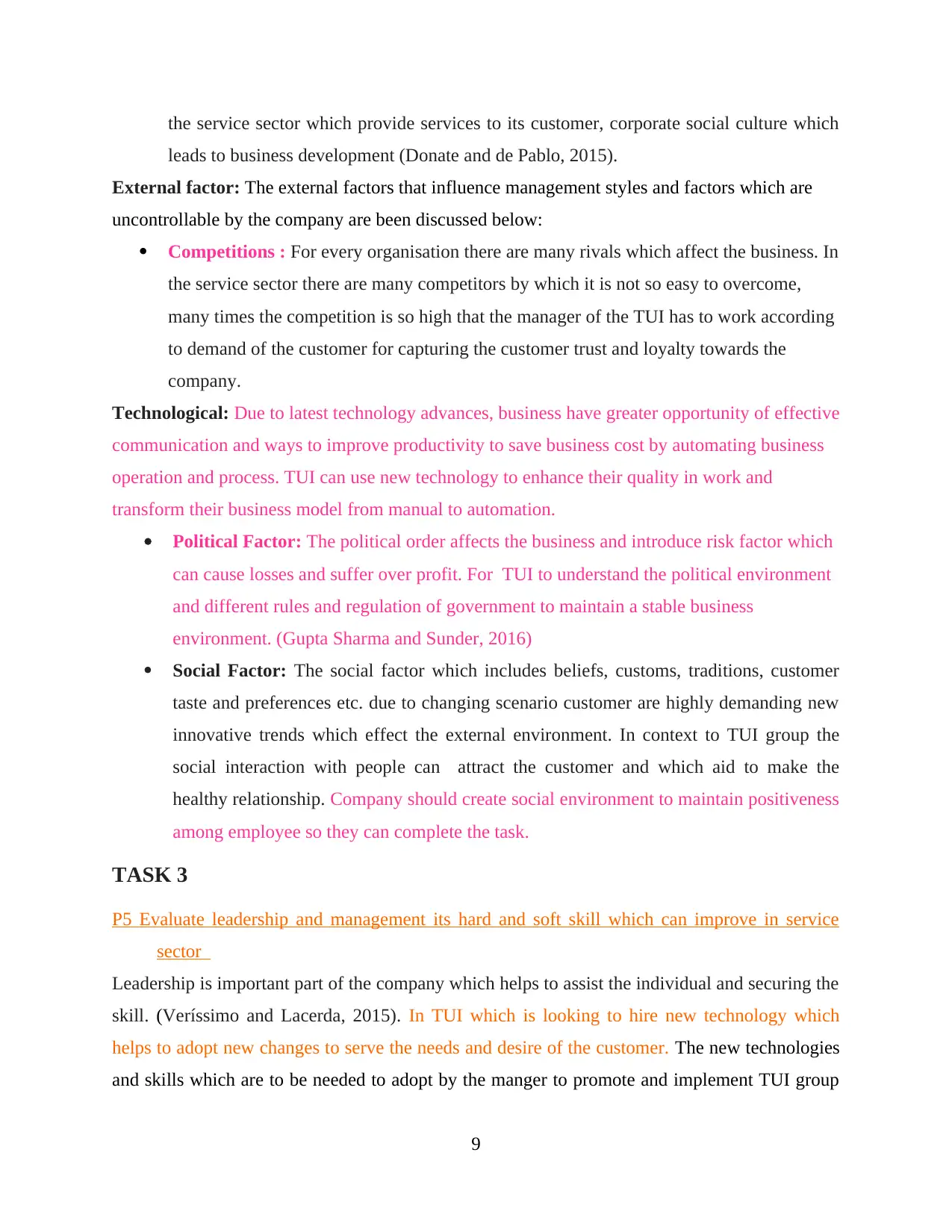
the service sector which provide services to its customer, corporate social culture which
leads to business development (Donate and de Pablo, 2015).
External factor: The external factors that influence management styles and factors which are
uncontrollable by the company are been discussed below:
Competitions : For every organisation there are many rivals which affect the business. In
the service sector there are many competitors by which it is not so easy to overcome,
many times the competition is so high that the manager of the TUI has to work according
to demand of the customer for capturing the customer trust and loyalty towards the
company.
Technological: Due to latest technology advances, business have greater opportunity of effective
communication and ways to improve productivity to save business cost by automating business
operation and process. TUI can use new technology to enhance their quality in work and
transform their business model from manual to automation.
Political Factor: The political order affects the business and introduce risk factor which
can cause losses and suffer over profit. For TUI to understand the political environment
and different rules and regulation of government to maintain a stable business
environment. (Gupta Sharma and Sunder, 2016)
Social Factor: The social factor which includes beliefs, customs, traditions, customer
taste and preferences etc. due to changing scenario customer are highly demanding new
innovative trends which effect the external environment. In context to TUI group the
social interaction with people can attract the customer and which aid to make the
healthy relationship. Company should create social environment to maintain positiveness
among employee so they can complete the task.
TASK 3
P5 Evaluate leadership and management its hard and soft skill which can improve in service
sector
Leadership is important part of the company which helps to assist the individual and securing the
skill. (Veríssimo and Lacerda, 2015). In TUI which is looking to hire new technology which
helps to adopt new changes to serve the needs and desire of the customer. The new technologies
and skills which are to be needed to adopt by the manger to promote and implement TUI group
9
leads to business development (Donate and de Pablo, 2015).
External factor: The external factors that influence management styles and factors which are
uncontrollable by the company are been discussed below:
Competitions : For every organisation there are many rivals which affect the business. In
the service sector there are many competitors by which it is not so easy to overcome,
many times the competition is so high that the manager of the TUI has to work according
to demand of the customer for capturing the customer trust and loyalty towards the
company.
Technological: Due to latest technology advances, business have greater opportunity of effective
communication and ways to improve productivity to save business cost by automating business
operation and process. TUI can use new technology to enhance their quality in work and
transform their business model from manual to automation.
Political Factor: The political order affects the business and introduce risk factor which
can cause losses and suffer over profit. For TUI to understand the political environment
and different rules and regulation of government to maintain a stable business
environment. (Gupta Sharma and Sunder, 2016)
Social Factor: The social factor which includes beliefs, customs, traditions, customer
taste and preferences etc. due to changing scenario customer are highly demanding new
innovative trends which effect the external environment. In context to TUI group the
social interaction with people can attract the customer and which aid to make the
healthy relationship. Company should create social environment to maintain positiveness
among employee so they can complete the task.
TASK 3
P5 Evaluate leadership and management its hard and soft skill which can improve in service
sector
Leadership is important part of the company which helps to assist the individual and securing the
skill. (Veríssimo and Lacerda, 2015). In TUI which is looking to hire new technology which
helps to adopt new changes to serve the needs and desire of the customer. The new technologies
and skills which are to be needed to adopt by the manger to promote and implement TUI group
9
⊘ This is a preview!⊘
Do you want full access?
Subscribe today to unlock all pages.

Trusted by 1+ million students worldwide
1 out of 20
Related Documents
Your All-in-One AI-Powered Toolkit for Academic Success.
+13062052269
info@desklib.com
Available 24*7 on WhatsApp / Email
![[object Object]](/_next/static/media/star-bottom.7253800d.svg)
Unlock your academic potential
Copyright © 2020–2026 A2Z Services. All Rights Reserved. Developed and managed by ZUCOL.





